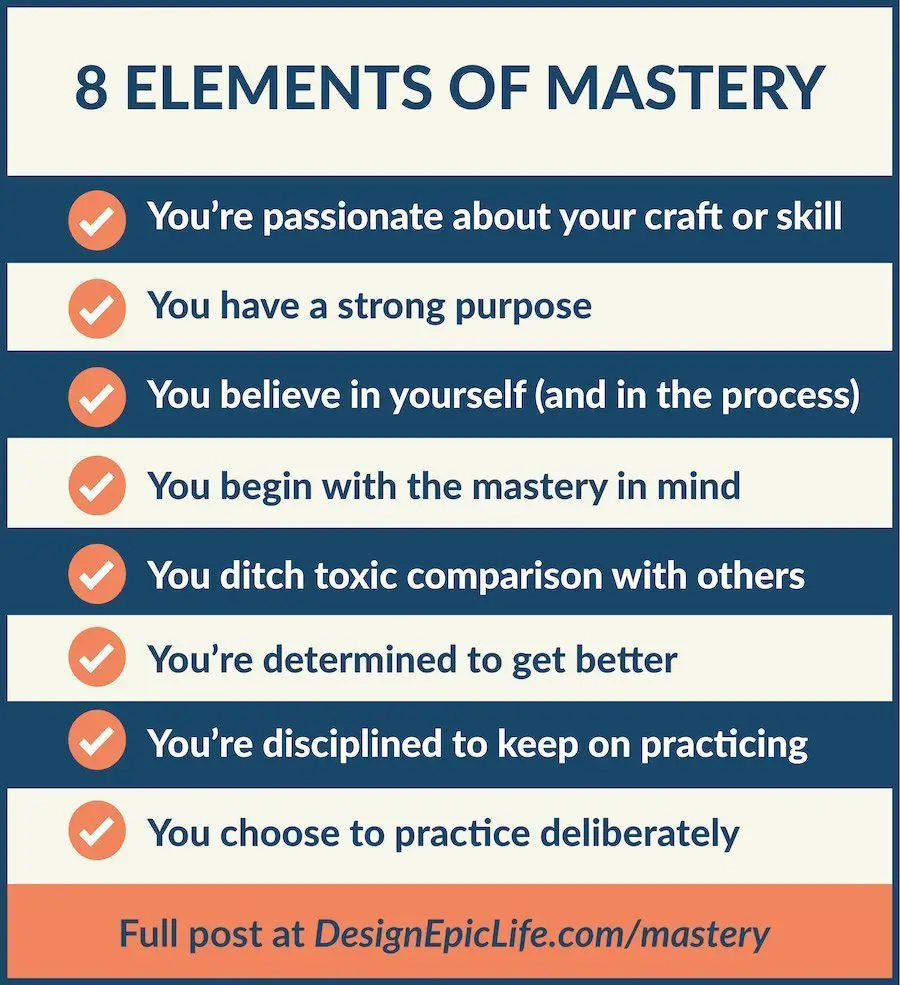10 Stages Of Creating Masterpieces In Your Crowded Field
Everybody knows how to succeed these days. The online world is full of articles telling you the exact steps to achieve anything.
You know the drill… create a vision, set goals, work towards them, and congratulations, you win.
There’s nothing wrong with a success roadmap blueprint. That’s how people succeed. But what about those who don’t succeed? They follow the same guidelines, and yet, the result is different.
Now I can go on and on talking about the right mindset, burning desire, persistence, and so on. But today, let me give you the hard truth you need to hear about success.
Success often requires mastery. Being good is not enough anymore. The amount of success you achieve is directly proportional to mastery over your skills and knowledge.
Why? Because it leads you to offer unique and rare value to the world.
Now here’s the interesting part…
Those who don’t realize this simple truth, don’t achieve massive success.
Those who realize the truth, also rarely succeed because of paralysis from imposter syndrome.
You see, when you’re not naturally talented at something, there’s a gap between where you are and where you want to be. So you doubt yourself. After all, you have a solid, logical reason to do so.
You’re not special. You’re not talented. You’re not an expert. Your skills aren’t good enough.
Then there are people who are a thousand times better or more talented than you.
So the question remains — Is it worth it? Will you ever be good enough?
The answer to that lies within you.
What It Takes To Master A Craft Or Skill
First, you’ll know when you’re truly passionate about something. So don’t ignore your inner voice.
Next, you need a strong purpose to get better. When you have a purpose, you find a way to persist in the long-term.
Then, you need to believe you can become way better at anything you work towards. That’s the growth mindset in essence. The opposite of which is a fixed mindset that can hold anyone back.
To achieve mastery, it’s not enough to just believe you can become better. You need to begin with mastery in mind. You don’t have to “fake it till you make it”. Instead, you need to realize where you are and who you want to become. Then, act according to who you want to become.
For example, you may want to learn to play the piano from scratch. Instead of focusing on how you may have failed before, focus on the result of becoming a master at playing the piano and the practice that will get you there. You realize you’re just getting started, but you trust yourself and truly believe you’ll achieve mastery when you put in the work required. So you do what the top in the field do — put in hours of practice.
After that, you must stop comparing yourself to others. Everyone is running their own race, and the only person you need to compare yourself with is who you were yesterday.
Healthy competition is helpful while an unhealthy comparison is toxic. The former is about growing together in an inspiring environment, the latter is plain egotistical.
To find out which one rules your mind, ask yourself this — when you notice the best in the world in your field, what comes to your mind — discouragement or inspiration?
If you feel inspired, it means you respect your craft or skill and acknowledge the hard work required to achieve mastery. Discouragement often comes to us when our ego takes over. To tackle discouragement, shift your focus from yourself to your craft or skill for unlimited inspiration.
The next question for you is this — are you determined to get better? Because mastery only comes to those who commit. You don’t have to master everything in life. So make this decision wisely, based on your passion, purpose, and intuition.
The next thing you need is the discipline to follow through with your commitments even when you don’t feel like it. That’s where life tests the strength of your purpose and determination.
As Steven Pressfield puts it, you’ll face the resistance coming from your lizard brain every day when it’s to practice your craft or skill.
The artist committing himself to his calling has volunteered for hell, whether he knows it or not. He will be dining for the duration on a diet of isolation, rejection, self-doubt, despair, ridicule, contempt, and humiliation. – Steven Pressfield
Finally, you need to make the best use of the time and energy you put into practice. That’s where deliberate practice comes in. Instead of mindlessly practicing more and more, adjust your training according to the feedback that may come from:
a) Someone who is already skilled at what you want to improve.
b) Your audience.
c) Conscious tracking and adjusting.
Okay, so now you know the 8 elements of mastery:

- You’re passionate about your craft or skill
- You have a strong purpose
- You believe in yourself (and in the process)
- You begin with the mastery in mind (for doing what masters do)
- You ditch toxic comparison with others
- You’re determined to get better
- You’re disciplined to keep on practicing
- You choose to practice deliberately
Good!
With that in mind, you may want to accelerate the learning process with the learning tools and websites I recommend.
Now be prepared to go through this 10-step process on your way to mastery:
Becoming A Master In Your Field: The 10 Stages

Stage 1: Admiring the good and getting inspired
You feel a sense of awe when you see great works in your field.
Stage 2: Doing the work and hating your work
You try it out, only to find out how awful your work is.
Stage 3: Understanding the good
You start differentiating between the good and the average.
Stage 4: Doing more work and not being satisfied
With your new understanding, you give it more tries, but still, you aren’t satisfied.
Stage 5: Identifying the micros in the good
You start noticing the minor details in the great work.
Stage 6: Doing more work and improving
You keep at it and notice an improvement, which makes you proud.
Stage 7: Analyzing the good and the bad in depth
You can easily identify and explain the difference between the good and the bad.
Stage 8: Doing more work and testing things out
You do more work and start experimenting.
Stage 9: Adding your own creativity
You come up with your own thoughts and ideas, which makes people notice your work.
Stage 10: Creating masterpieces
You keep putting in more work and create masterpieces in the process.
After that, it’s just a matter of repetition and continuous improvement to increase the rate of creating masterpieces.
Can you see yourself in one of the steps?
The truth is that the path to mastery isn’t easy. It’s full of disappointments and failures. But if you want great results, you must embrace the process.
The process stands in the way to differentiate between the dabblers and masters. Which one will you be?
When the going gets tough, keep Michelangelo words in mind…
If people knew how hard I worked to get my mastery, it wouldn’t seem so wonderful at all. – Michelangelo

